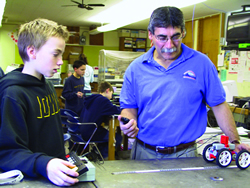Building Character
 |
If
you’re one of those people who thinks scientific research
is all about antiseptic rooms, white lab coats, latex gloves,
and test tubes, you probably wouldn’t feel at home in
one of Hector Ibarra’s (BS ‘75/MS
‘92/PhD ’05) classes.
The West Branch Middle School science teacher believes students
should get their hands a little dirty while learning about
physics, ecology, chemistry, and other subjects.
Take a used oil filter for instance. It’s loaded with
used oil, which is why you don’t want to toss it in
the local landfill, where the oil can leach into the soil
and contaminate groundwater. It’s also full of other
things, too, that might be recycled, like plastics, metals
and lots and lots of paper, which is what holds all that oil
in there.
Ibarra said that when his students dismantle used oil filters,
they are equally surprised at how much waste is contained
in such small canisters. And he likes that—the surprise—because
he said it goes a long way toward helping students remember,
understand, and appreciate science in ways textbook readings
alone can never equal.
“I like the idea that kids are problem solving and asking
what’s going on, how it’s going to affect them,
and increasing their critical-thinking skills,” said
Ibarra, who teaches sixth- and seventh-grade general and earth
science.
For the last half of a nearly 30-year teaching career, the
problems Ibarra has posed to his students have been largely
environmental, like pollution and the dwindling supply of
fossil fuels. But don’t call Ibarra a “tree hugger,”
a term that he says carries too many negative connotations.
The truth is, Ibarra isn’t a big fan of hiking in the
woods or paddling canoes. If he’s ever had an epiphany
about teaching environmental science, it came to him not on
top of a snow-capped mountain, but in a class taught by UI
Science Education faculty member John Dunkhase.
Ibarra said Dunkhase got him fired up about inquiry teaching
while taking a class from him as part of his master’s
degree program. Inquiry teaching, Dunkhase says, encourages
students to learn by doing rather than just by memorizing
texts and concepts.
Curious how solar energy works? Build a small-scale vehicle
with a solar panel, drive it around, and measure just how
much of the sun’s energy it takes to make it move, like
Ibarra’s students have.
Think the school district is wasting money by using standard
light bulbs? Study the wattage of the old lights, the cost
to light them, and then calculate the potential savings of
switching to fluorescent lights, like Ibarra has, saving the
district about $1,000 a month on electric bills. The project
was so successful that it caught the attention of former President
Bill Clinton, who cited Ibarra’s study in a 1997 address
on global climate change.
Since 1992, Ibarra’s commitment to science education
has earned him nearly $500,000 in grants and an endless string
of honors. He was named to the 2002 All-USA Teacher Team,
USA TODAY’s recognition program for outstanding teachers.
And earlier this year, Wal-Mart and Phi Delta Kappa named
him National Teacher of the Year for his innovation in the
classroom.
He also inspires his students to do great things. Sixteen
of them have each netted $7,000 in competitive research grants
from the U.S. Army after developing projects addressing everything
from lead in paint, pottery, and even candy, to the particular
hazards faced by young drivers in rural communities.
Many have made careers of science. One former student is working
on a master’s degree to become an agricultural meteorologist.
Another became a Rhodes Scholar and now teaches computer science
at an Ivy League university.
For all his success and recognition, Ibarra said he hopes
his teaching does more than simply educate his students.
“The big part of teaching isn’t really what students
are learning in class,”
Ibarra said. “It’s about helping them become responsible
adults and developing respect and character.”
–by Stephen Pradarelli
“A thousand
fibers connect us with our fellow-men; and along
those fibers, as sympathetic threads, our actions
run as causes, and they come back to us as effects.”
Herman Melville
|
|
 
|